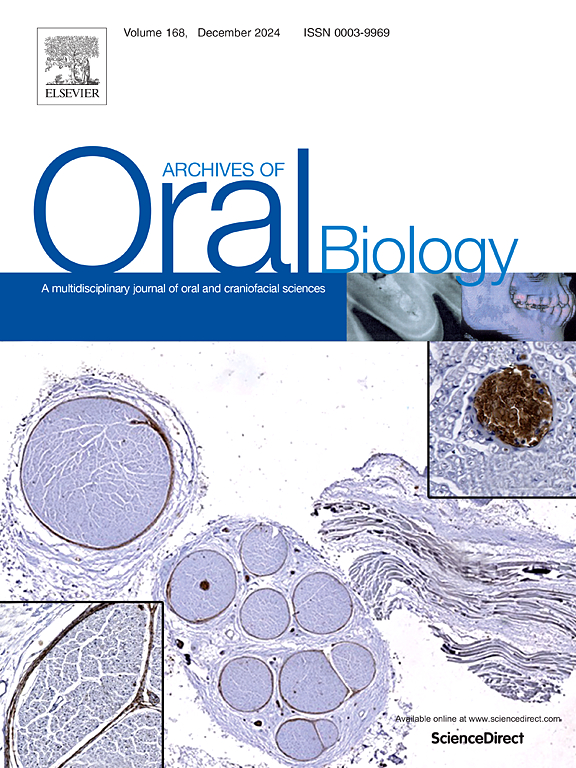Multi-strain probiotic formula modulates expression of β-defensin-2, β-defensin-3, and TLR-4 in male rats with apical periodontitis
IF 2.2
4区 医学
Q2 DENTISTRY, ORAL SURGERY & MEDICINE
引用次数: 0
Abstract
Objective
Evaluate whether a multi-strain probiotic formula affects blood parameters (hematologic, calcium, and phosphorus levels) and alters the expression of β-defensin-2, β-defensin-3, and toll-like receptor 4 in male rats with induced apical periodontitis (AP).
Design
Wistar rats were divided into two groups (n = 8 each): (1) rats with AP on a regular diet (Control) and (2) rats with AP on a regular diet supplemented with the multi-strain probiotic GNC Probiotic Complex (GCP) at one billion CFU. AP was induced by exposing the dental pulp of the first molars to the oral environment. GCP was administered daily via gavage for 30 days during AP development. After 30 days, animals were anesthetized, a cardiac puncture was performed, and 5 mL of blood was collected for hematologic, calcium, and phosphorus analysis. Animals were then euthanized, and mandibles were removed for histological and immunochemical analysis of β-defensin-2, β-defensin-3, and toll-like receptor 4. Statistical analyses used Mann–Whitney U and Student’s t-tests, with significance at P < 0.05.
Results
No significant differences were observed in blood parameters between the Control and GCP groups (P > 0.05). In AP, the Control group showed more intense inflammatory infiltrates and higher median severity scores than the GCP group (P < 0.05). Immunoreactivity levels for β-defensin-2, β-defensin-3, and toll-like receptor 4 were significantly increased in the GCP group (P < 0.05).
Conclusion
Probiotic complex reduces inflammation and enhances immunolabeling of β-defensin-2, β-defensin-3, and toll-like receptor 4 in AP.
多菌种益生菌配方调节雄性根尖牙周炎大鼠β-防御素-2、β-防御素-3和TLR-4的表达。
目的:评价多菌种益生菌配方是否影响雄性根尖牙周炎(AP)大鼠血液参数(血液学、钙、磷水平)及β-防御素-2、β-防御素-3和toll样受体4的表达。设计:Wistar大鼠分为两组(n = ,每组8只):(1)常规饲粮中添加AP大鼠(对照组);(2)常规饲粮中添加10亿CFU的多菌种益生菌GNC益生菌复合物(GCP)。将第一磨牙牙髓暴露于口腔环境中诱发AP。在AP发展期间,每天灌胃给予GCP,持续30天。30 d后,麻醉动物,穿刺心脏,取5 mL血液进行血液学、钙、磷分析。然后对动物实施安乐死,取下颌骨进行β-防御素-2、β-防御素-3和toll样受体4的组织学和免疫化学分析。统计分析采用Mann-Whitney U检验和Student’st检验,P值为 。结果:对照组和GCP组之间的血液参数无显著差异(P > 0.05)。在AP中,对照组比GCP组表现出更强烈的炎症浸润和更高的中位严重程度评分(P )结论:益生菌复合物可以减轻炎症,增强AP中β-防御素-2、β-防御素-3和toll样受体4的免疫标记。
本文章由计算机程序翻译,如有差异,请以英文原文为准。
求助全文
约1分钟内获得全文
求助全文
来源期刊

Archives of oral biology
医学-牙科与口腔外科
CiteScore
5.10
自引率
3.30%
发文量
177
审稿时长
26 days
期刊介绍:
Archives of Oral Biology is an international journal which aims to publish papers of the highest scientific quality in the oral and craniofacial sciences. The journal is particularly interested in research which advances knowledge in the mechanisms of craniofacial development and disease, including:
Cell and molecular biology
Molecular genetics
Immunology
Pathogenesis
Cellular microbiology
Embryology
Syndromology
Forensic dentistry
 求助内容:
求助内容: 应助结果提醒方式:
应助结果提醒方式:


